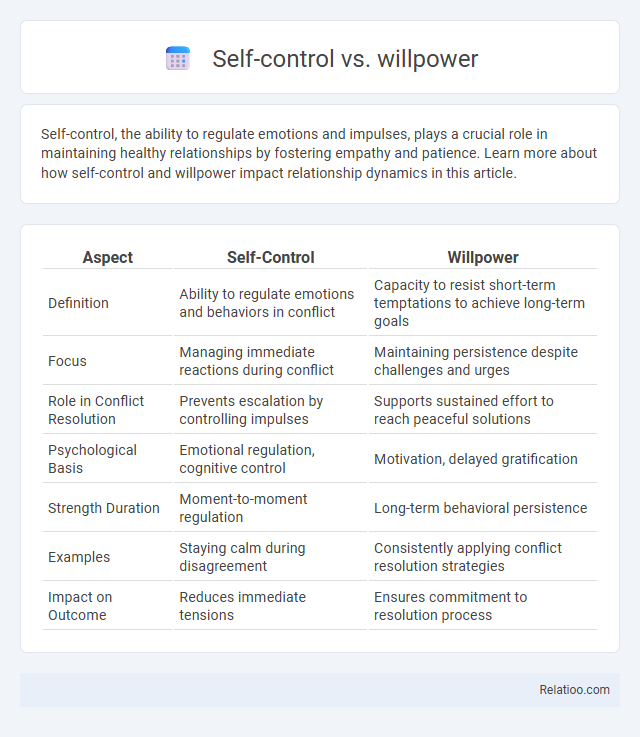Self-control, the ability to regulate emotions and impulses, plays a crucial role in maintaining healthy relationships by fostering empathy and patience. Learn more about how self-control and willpower impact relationship dynamics in this article.
Table of Comparison
| Aspect | Self-Control | Willpower |
|---|---|---|
| Definition | Ability to regulate emotions and behaviors in conflict | Capacity to resist short-term temptations to achieve long-term goals |
| Focus | Managing immediate reactions during conflict | Maintaining persistence despite challenges and urges |
| Role in Conflict Resolution | Prevents escalation by controlling impulses | Supports sustained effort to reach peaceful solutions |
| Psychological Basis | Emotional regulation, cognitive control | Motivation, delayed gratification |
| Strength Duration | Moment-to-moment regulation | Long-term behavioral persistence |
| Examples | Staying calm during disagreement | Consistently applying conflict resolution strategies |
| Impact on Outcome | Reduces immediate tensions | Ensures commitment to resolution process |
Understanding Self-Control and Willpower
Understanding self-control involves managing impulses to achieve long-term goals, while willpower refers to the mental energy required to resist short-term temptations. Both cognitive processes are essential for behavior regulation but operate differently; self-control acts as a sustained effort, whereas willpower is often a limited resource that can be depleted. Strengthening your ability to balance these factors improves decision-making and enhances personal productivity.
Key Differences Between Self-Control and Willpower
Self-control refers to the ability to regulate your emotions, thoughts, and behaviors to achieve long-term goals, while willpower is the exertion of mental energy to resist short-term temptations or impulses. Self-control is a broader, sustained process involving habits and strategies, whereas willpower is often a momentary effort requiring intense focus. Your success in behavior change improves when you develop strong self-control habits rather than relying solely on episodic bursts of willpower.
The Science Behind Self-Control
The science behind self-control reveals it as the mental ability to regulate emotions, thoughts, and behaviors in pursuit of long-term goals, distinct yet intertwined with willpower, which is the energy or effort required to resist short-term temptations. Self-control operates through the prefrontal cortex, managing impulses and decision-making processes, while willpower can fluctuate based on factors like fatigue and stress. Understanding these mechanisms helps you enhance your personal discipline by recognizing the limits and capacities of both self-control and willpower.
How Willpower Functions in Everyday Life
Willpower functions as the mental energy that helps you resist short-term temptations and make decisions aligned with long-term goals by activating the brain's prefrontal cortex. Self-control manifests through consistent behavior regulation, relying on willpower as a limited resource that can be depleted by stress or fatigue. Your ability to maintain self-control hinges on managing willpower effectively in daily situations like dieting, work productivity, and emotional regulation.
Factors That Affect Self-Control
Self-control, willpower, and self-discipline are interconnected yet distinct concepts that influence your ability to regulate impulses and maintain goal-directed behavior. Factors affecting self-control include mental fatigue, stress levels, sleep quality, and environmental cues, all of which can significantly impact your capacity to resist temptations. Understanding these variables allows you to develop strategies that strengthen willpower and improve overall self-regulation.
Ways to Strengthen Willpower
Strengthening willpower involves consistent practice of self-control techniques, such as setting clear goals, monitoring progress, and reducing exposure to temptations. Research shows that willpower functions like a muscle that can be developed through regular mental exercises and stress management strategies. Implementing mindfulness meditation and maintaining a balanced diet further enhance cognitive resilience, directly improving the capacity for sustained self-discipline.
The Role of Habits in Self-Control
Habits play a crucial role in self-control by automating behaviors that align with long-term goals, reducing the need for conscious willpower. Consistent habit formation strengthens neural pathways, making self-control more sustainable and less mentally exhausting compared to relying solely on willpower. Developing positive routines creates an environment where self-regulation becomes instinctive, enhancing overall behavioral consistency.
Overcoming Common Self-Control Challenges
You can overcome common self-control challenges by strengthening both willpower and self-discipline, as willpower acts as the mental energy to resist temptations while self-control involves regulating behaviors and emotions. Strategies like setting specific goals, creating structured routines, and practicing mindfulness improve focus and reduce impulsive actions. Understanding the differences and leveraging techniques tailored to boost willpower and self-control enhances your ability to maintain long-term success in personal and professional endeavors.
Practical Tips to Boost Self-Control and Willpower
Self-control and willpower both involve the ability to regulate impulses and maintain focus on long-term goals, but self-control refers to the ongoing management of behavior, while willpower is the momentary strength to overcome temptation. Boosting self-control and willpower can be achieved through practical strategies such as setting specific goals, practicing mindfulness meditation, and developing consistent routines that reduce decision fatigue. Research shows that adequate sleep, balanced nutrition, and regular physical exercise also strengthen the neural pathways associated with self-regulation, enhancing overall ability to resist distractions and maintain disciplined behavior.
Self-Control vs Willpower: Which Is More Important?
Self-control and willpower both play crucial roles in achieving your goals, but self-control is often more sustainable because it involves long-term regulation of behavior, emotions, and impulses, whereas willpower is the immediate effort to resist temptation. Research indicates that strengthening self-control leads to better outcomes in areas like health, productivity, and relationships compared to relying solely on willpower, which can be depleted quickly. Understanding the difference empowers you to develop habits that enhance lasting self-regulation rather than momentary resistance alone.

Infographic: Self-control vs Willpower
 relatioo.com
relatioo.com